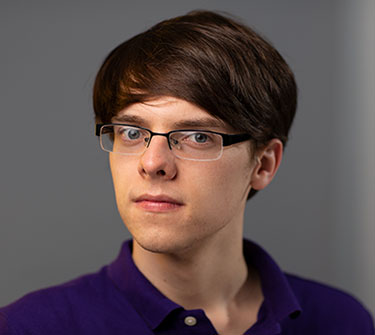
His interest in biophysics is particularly focused on the discipline of molecular genetics.
“This research could unlock new areas of nanoengineering by treating DNA as a sort of scaffold for use in self-assembling nanostructures,” he wrote in his application. “This research area is relatively young, but already shows promise for applications ranging from medicine, where DNA structures could be used for drug delivery, to electronics, where components tagged with pre-programmed [DNA] could self-assemble into functioning circuits.”
The Goldwater Scholarship will help fund the final year of McMillan’s undergraduate education. After graduating from Amherst with a major in physics, he plans to pursue a Ph.D. in physics, and hopes to ultimately teach at a research university.
“The feeling of discovery when my work explains some small part of the natural world drives me to pursue research as a career, while the opportunity to work with other passionate, driven people keeps me excited about research,” he wrote.
McMillan decided upon this career path following a summer of lab study in 2017, working on a project that had failed to show results until the very last days.
“Each failure prompted a conversation,” he wrote.
McMillan has worked extensively in the lab of physics professor Ashley R. Carter, which focuses on studying the mechanical properties of biological molecules or cells, using laser optics, microscopy and biochemistry. His research projects in Carter’s lab have involved using proteins to fold and unfold DNA in sperm cells.
In the summer of 2018, he assisted in the microbiology laboratory of Professor Karin Jacobs at Saarland University in Saarbrücken, Germany. There he studied how bacteria adhere to tooth surfaces—research which could be useful in developing antibacterial dental prosthetics.
“In addition to the standard physics laboratory techniques I learned through classes,” he wrote, “I’ve acquired specialized biophysical techniques such as atomic force microscopy through my research with professors both at my home institution and abroad.”
McMillan said that his parents are both physicians who encouraged his scientific inquiry from an early age.
“I used to bombard my mother with questions about the world—Why is the sky blue? How do cars work? Why are the days 24 hours?—until she didn’t know the answers anymore,” he said. “My parents filled the house with books about science, [and] in elementary school, I spent much of my time outside of school reading through these books and sharing what I had learned.”
The Barry M. Goldwater Scholarship and Excellence in Education Program was authorized by the U.S. Congress in 1986. The program awards undergraduate scholarships annually on the basis of merit to sophomores and juniors who have outstanding potential and intend to pursue careers in mathematics, the natural sciences or engineering. Each scholarship covers eligible expenses for undergraduate tuition, fees, books, and room and board, up to $7,500 annually.
The Goldwater Scholarship Foundation named a record 496 scholars this year, thanks to additional support from Congress and the U.S. Department of Defense. For the 2019 competition, 443 institutions nominated 1,223 undergraduates.
"This award couldn’t have been given to a more deserving student," Carter said. "Ryan is a careful and meticulous scientist who isn’t afraid to ask tough questions and work hard to get answers. His ability to think creatively, to communicate his science, and to collaborate with others is outstanding."